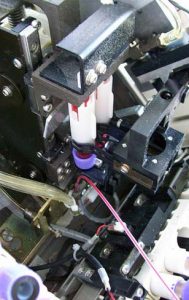Ron Hines DVM PhD
 See What Normal Blood & Urine Values Are
See What Normal Blood & Urine Values Are
 Causes Of Most Abnormal Blood & Urine Tests
Causes Of Most Abnormal Blood & Urine Tests
Your Pet’s Blood Globulin Level = GLOB
Globulins are one of the three major proteins that are dissolved in your dog or cat’s blood. Albumin and fibrinogen are the other two. The globulins that interest veterinarians most are the gamma globulins (IgG) that are produced by your pet’s lymphocytes and plasma cells as well as IgE, the class of globulin molecules often associated with allergies. Those globulins (and similar “relatives”) are also called its immunoglobulins or antibodies. Their level and what they were specifically designed to fight, often help your veterinarian decide what infectious organisms your pet has been exposed to as well as the strength of its vaccine immunity (its vaccine titer) or the general strength of the pet’s immune system. Much less frequently, an unexplained rise in a specific immunoglobulin in your dog or cat’s blood indicates cancer of the bone marrow cell line that produced it (a myeloma).
Reasons Your Pet’s Globulin Levels Might Be Increased (hyperglobulinemia):
Ehrlichia infection in dogs and FIP disease in cats, canine heartworm infection, leishmania infection, chronic liver disease, lupus and other autoimmune type diseases, response to chronic infections and inflammations of many kinds, chronic and severe dental (periodontal disease), Cancer of the cells that produce one or several specific antibodies (monoclonal or polyclonal gammopathies) myeloma can all cause high blood globulin levels. High blood globulin level (hyperglobulinemia) and skewed A:G ratios have been noted in subclinical bartonella infections in cats – often accompanied by fever and a history of flea exposure.
Inherited Intestinal disease in basenji dogs (basenji immuno-proliferative bowel disease), Familial Shar-Pei Fever (FSF, SHS) can also cause high blood globulin levels.
Reasons Your Dog and Cat’s Globulin Levels Might Be Reduced (= hypoglobulinemia or immunodeficiency):
Feline leukemia, feline AIDS (feline immunodeficiency virus), canine distemper, demodectic mange and toxoplasmosis can all reduce your dog or cat’s blood globulin level. In some of these infections like demodectic mange and toxoplasmosis, veterinarians do not know whether the low globulin level is the cause or the result of the infection.
Blood globulins are always low in the newborn – particularly if they did not receive their first milk (colostrum). Genetic immune system deficiencies (inherited hypogammaglobulinemia), reduced T-cell numbers or function, severe moist skin infections, cancer and long-term corticosteroid administration can also cause low blood globulin levels.
Inherited reduced immune function and low gamma globulin levels (combined immunodeficiencies) are occasionally seen in dachshunds, corgies, basset hounds, dobermans, shar pies, beagles, Airedales and German Shepherds. Thymus gland atrophy (shrinkage) can have the same effect.
Total globulins (but not necessarily gamma globulin) can go down in chronic liver or kidney disease, miss-routed liver blood circulation (portosystemic shunts), malnutrition, severe or persistent hemorrhage, protein-leaking intestinal diseases (enteropathies) and when intestinal parasites (e.g. hookworms) are present in large numbers.
Globulin levels are naturally lower in greyhounds and possibly other sight hounds as well (2.1-3.2 vs 2.8-4.2) (read here).
Complementary Tests:
A:G ratio, TP, serum electrophoresis, bone marrow exam (M:E ratio) (+spleen/liver gamma G sources in cats), When high, occult (hidden) heartworm test.
CBC/WBC, A:G ratio, urinalysis, blood chemistry panel, (for evidence of liver enzyme abnormalities when albumin is low) + bile acids, cobalamin and folic acid when intestinal loss of albumin is suspected. Fecal parasite check when intestinal parasites could be the cause of low blood albumin. When A:G ratio in dogs is low and tick/flea exposure was likely, a tick panel for systemic parasites such as Ehrlichia (e.g. Idexx#2902). In cats with low A:G ratios, bartonella PCR test (e.g. Idexx#3540) particular if associated with fevers and a history of flea exposure.
When globulin is high or low, perhaps a Protein Electrophoresis and M:E ratio would also be in order if other tests are uninformative.
DxMe
You are on the Vetspace animal health website
Visiting the products that you see displayed on this website help pay the cost of keeping these articles on the Internet.


